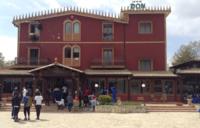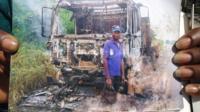April 25, 2015
Thousands of people have lost their lives over the last two years making the perilous journey across the Mediterranean to find a new life in Europe. Here, two survivors who made it to the Sicilian port of Augusta describe why they made the difficult decision to leave their homes and families.
Malick Touray, 30, The Gambia
Journey: approx 7,600km, (4,750 miles)
Serekunda, The Gambia – Bamako, Mali – Benin, Nigeria – Agadez, Niger – Qatrun, Libya – Sabha – Tripoli – Augusta, Italy
Malick, a 30-year-old mobile phone technician, describes how he began his journey across Africa to Europe in October 2012 because of his financial situation, struggling to support his extended family.
He had finished school early and started work because his father – who has three wives – could no longer pay school fees for Malick and his 18 other children.
But, after leaving home, Malick could only afford to travel as far as Bamako, Mali.
“I stayed there for a few months and worked again as a mobile phone technician,” he says. “The pay was meagre and I moved on to find better paid work in Nigeria.”
While in Nigeria, he met and fell in love with his wife Aibas.
“She’s Christian and I’m Muslim,” he says, “but all that matters to us, is that we love each other.”
Accepted by her family, the couple were married soon after. However, they struggled to make ends meet and decided to make the journey to Europe to search for a better life.
They paid a truck driver to hide them as they crossed the border from Nigeria to Niger, where Malick found work again in Agadez.
Libyan prison
After three months, the couple had saved enough money to continue their journey to Libya. However, after boarding one of two buses to cross the desert, disaster struck.
“We were driving about two kilometres ahead and got a message that the other bus had been stopped by rebels,” says Malick. “They killed the driver, seized the bus and robbed the passengers.”

Malick and Aibas eventually made it to Libya and reached Qatrun, in the south. But, after struggling to find work, they continued north to the city of Sabha.
Again the couple stayed put to earn money before taking the onward journey to Tripoli in November 2013. By then, Malick had been on the road for more than a year.
He describes life in Tripoli as “very tough”. Despite finding work repairing phones, he was arrested for being an illegal immigrant. It was also at this time that his wife lost their first child, who died at birth.
“She was too afraid to go to hospital for fear of being arrested,” says Malick. “She had to bury the baby with the help of some Nigerian friends we’d made in Tripoli. I never saw my baby and don’t where she was buried.”
Malick’s wife went on to borrow money from Nigerian friends to bail her husband out of prison and he returned to working in a mobile phone shop. It was here, through Libyan contacts, that the couple learned of a man who took people to Italy for 800 Dinar each (543 euros, £389). Malick worked for two months in return for the crossing fare.
Sea rescue
Then, one evening, the couple were driven to a beach not far from Tripoli to take the trip.
While at sea, we passed three or four capsized boats… there were clothes, food and other things floating in the water”
“There were about 100 people waiting, mainly from Nigeria, Senegal and Gambia,” says Malick. “The traffickers don’t like to mix nationalities on the boats and keep people of similar language groups together.
“Nigerians, Malians, Gambians and Senegalese would travel in one group. Somalis, Ethiopians and Eritreans in another and Syrians, Palestinians and other Arabs in another boat.”
The couple’s boat left Libya at about 04:30 local time and by 14:00 they had reached international waters.
“We had passed three or four capsized boats,” says Malick. “We didn’t see any bodies but there were clothes, food and other things floating in the water.”
Once in open waters, the boat’s captain contacted the Italian coastguard and gave the boat’s position and the number of people on board. They were told to stay put and that a cargo ship would be heading to help them.
“Our boat was small and leaking so a group of men had to constantly use buckets to get rid of the water and keep us afloat,” says Malick.

Eventually, a container ship arrived providing the smaller vessel with supplies. The crew threw down ropes to prevent the boat sinking until the Italian coastguards arrived to complete the rescue.
Now, safely on Italian soil, Malick and his wife know they are lucky to have survived their journey.
“I am determined to work as a mobile phone technician in Europe and support my wife as well as my extended family in the Gambia,” he says.
Queen, 22, Nigeria
Journey: approx. 4,911km (3,070 miles)
Delta State, Nigeria – Agadez, Niger – Tripoli, Libya – Augusta, Italy
Queen, a 22-year-old hairdresser, left her village in Nigeria’s Delta State when she was just 14 years old to work as a domestic helper in the country’s commercial capital Lagos.
With the money she earned, she paid her school fees and trained as a hairdresser
.
“I have been working as a hairdresser for the last two years,” she says.
Queen, who has five siblings, describes how her family struggled to get by after her father abandoned the family when she was just 12, leaving her brother Joshua as the main wage earner.
I wasn’t able to look after my family with my meagre wages as a hairdresser. In February, I decided to leave for Europe”
The family’s financial problems were compounded when, in December 2014, Joshua was involved in an accident while driving a company truck.
“The truck caught fire and was totally destroyed,” says Queen. “The company blamed him for the accident and wanted him to pay eight million Naira (37,472 euros, £26,748). He has been in jail since December, leaving the family without much of an income.”
After the accident, Queen moved back to her village, but she wasn’t able to look after her family on her hairdressing wages.
So, in February, she decided to leave for Europe, where she hopes to “earn enough money to support them”.
She paid about 25,000 Naira (117 euros; £83) to get to Agadez in Niger. From there, she travelled on to Tripoli in Libya, where she managed to find a boat to cross the Mediterranean.
“On 14 April, I left Libya on a boat with 85 people on board. We were rescued by Italian ship after about 28 hours at sea and taken to Augusta port in Sicily,” she says.
She is now living with 110 other migrants at the Don Bosco Oasis Hotel near Syracuse in Sicily, from where she hopes to resume work as a hairdresser.

The deadly journey
More than 1,700 people are believed to have died this year so far making the treacherous journey across the Mediterranean to Europe. This compares with 96 deaths up to the end of April last year.
As many as 800 migrants are feared drowned after the boat they were travelling in capsized in Libyan waters south of the Italian island of Lampedusa on Sunday.
The International Organization for Migration (IOM) believes the number of migrants dying in Mediterranean Sea crossings could hit 30,000 this year if the current rate continues.




